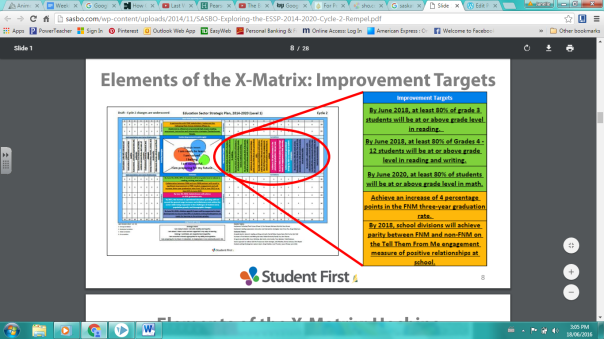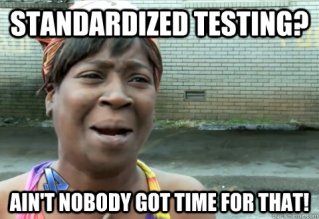Photo credit: Amazon.com (Buy it here) & Pranic Princess @ WordPress
“Deliverology.” What a load of crap!
Michael Barber needs a reality check about education. Obviously, the article “For Pearson, Common Core is for Profit” – Nicholas Tampio struck a chord with me this week. I read, mouth agape, through the entire article as Pearson Education and Michael Barber turned more from an educational business to a cult with every line that I read.
Barber published a book saying that we need to reject Pearson’s stranglehold on education, and yet offers “Deliverology” as a suggestion. Deliverology, which states that we need standardized tests (metrics),”a field guide — or a battle plan — showing education reformers how to push ahead through all resistance and never have second thoughts.” AND this program also “instructs leaders how to respond to common excuses from people who object to education reform” and tells “reformers to stick with their plans but acknowledge the emotional argument of opponents: “I understand why you might be angry; I would not enjoy this if it were happening to me either.” Sounds like we are moving from one type of Kool Aid to another. He talks about how we need to move away from Pearson and towards Deliverology. Which is not actually changing who controls education, but changing who we pay our money too to change education!
 Photo Credit: European Students Union
Photo Credit: European Students Union
Education is a public commodity. We are not directly charging students to come to our schools (unless you are private or charter), and we are offering the best education possible in tumultuous times. Pearson Education is making money because it offers standardized testing and materials to school boards who are supporting and following government measures to use standardized testing as a means to measure student, teacher and school success. The argument shouldn’t be about selling our educational souls to corporations, but why we believe that standardized testing is actually telling us how we are doing.
Standardized Testing is an issue which has been on the forefront of educational discussions for many years, and I imagine it will continue to be discussed. What I want to know is, how do we really “know” how well our students are doing? There are so many variables, exemptions and inconsistent standards that are involved with the testing, I personally don’t think it measures anything but how a teacher prepared their students for the exam and how well students can write these types of exams. It doesn’t show their skill sets or critical thinking, it shows how well the students can follow instructions and give the moderator what they are looking for.
I have many issues with standardized testing as it also doesn’t measure growth in literacy and numeracy. It measures how well students do on the same exam from the beginning to the end of the year, but it does not show from year to year how well students are doing if they are continually failing the exam. Let me give you an example. The school that I have been teaching at for the past seven years has incredible societal issues not seen in the “average” high school. We have extreme poverty, addictions to drugs and alcohol, major gang and crime involvement, teenage deaths, teenage pregnancy and incredibly low literacy and numeracy rates. All the standardized exams tell us is that we continually underperform. What they don’t show is how a student in grade 9 has gone from a grade 3 reading level to a grade 6 reading level in one year. Or how a student in grade ten who has never read a chapter book, can now read at grade level and is loving literature. That is growth! In the article “Pearson Education – Who are these people?” by Alan Singer, he discusses how some states are underperforming, however, these states are anti-union states. This means that teachers have little job security or protection, therefore, their scores were used as a way to fire and hire other “better performing” teachers. This is ridiculous. It is incredibly foolish to believe that Teacher Assessment evaluations be done by a third party company, who has absolutely no previous relationship or knowledge of teachers. Teachers will work hard if they are supported, encouraged, complimented, and working as a team. Scores on a standardized exam do not equate to solely student performance. There are many factors which can influence success.

Photo credit: The Forever Theme
Take graduation rates for example.Our school has a very high transciency rate as well, which always shows that we underperform for provincial graduation levels. However, we are constantly putting out 70% or higher graduates but because they transferred from another school during their high school career, the data shows that we “failed.” Reality check: Saskatchewan graduation rates have never been higher than 75.6% and yet our goal says over 85% by 2020 for on-time graduates and 65% First Nations and Metis students on time by June 2020. Are they nuts! We are facing more economic, political, and social issues than ever before. Let’s make better goals. Let’s talk about students moving reading levels, or student attendance markedly increasing (without a stupid final exam incentive), and how we are engaging students in meaningful learning geared towards future success and not standardized success. Graduation is a final goal, but should not be the only goal. We need to prepare students with excellent linguistic, mathematics, science, health/nutrition/exercise, social, technological, artistic and citizenship skills. Goals should be built around building and adding to a positive society versus “just graduating.”
The Ministry of Education has a big plan including HOSIN’s, but that plan has many flaws. (I know I’m a digressing but it has to be addressed). The overall plan has so many goals that the educational sector could not possibly complete with excellence, let alone actually attempt all of the changes. The Ministry wants exceptionally high numbers of children reading at or above grade levels, graduation rates which are 10-35% higher than current, and “high impact reading assessment, instruction and intervention strategies and parity between First Nations and Non-First Nations students in Tell Them From Me responses in regards to positive relationships at school.” Again I ask, are they nuts? How are we supposed to be achieving these goals with massive budget cuts, the loss of educational assistants, decrease in educational technology and programming, cuts to elective classes? If Pearson Education has an answer for this and can save the current state of education in Saskatchewan, then I say sell it! Sell it all! Because I am all out of ideas and I’m not getting enough supports or opportunities to figure out the answers any more!

Let’s face it, if there is money to be made in education, from vending machines and scoreboards to textbooks and standardized exams, someone is going to find a way to make it. I think we as educators, politicians, professors, parents and students, have to argue that the goals and focus on education needs to stop being such a global and wide sweeping focus on data and numbers, and a focus on our actual individual students. Are we teaching reading? Are we teaching writing? Are our students becoming successful and contributing members of society? Are we graduating students who can perform at their jobs and are competent workers? Are we helping change social justice in the world? If so, then we are being successful. If not, then we have some work to do. And a damn exam isn’t going to show me that!
Imagine what we could actually get done in the classroom if we didn’t have to prep, administer and grade all those exams?
Thanks for reading,
Janelle
Photo credit: Turtle Boy



Great read! I appreciate the energy and passion that comes out in your writing. Your post made me wonder… is there a non-kool-aid option… or are there just difference colors with varying levels of sweetness? I agree we need to recognize the progress that our students are making. Expecting someone to go from a grade 2 reading level to high school grade level in one year is extreme, we need to look at where students are and the progression that they have made through the year.
It makes me wonder what’s the real reason we want to compare standardized assessment data? To find the trends and dig into the struggles students are having so we can be more responsive educators… is it trying to communicate to governments and citizens where we are at…. is it to scare people into teaching to the test? Perhaps the value of standardized assessments comes from what we do with the data and the culture in which we teach.
LikeLike
HAHA I love the “different colours with varying levels of sweetness” comment Stephanie. I think you hit the nail on the head with that one! We are so focused on doing things the “way we have always done them” that we struggle with thinking that there might be others ways of testing and other ways to measure progress. Sometimes we focus too much on literacy and numeracy and we miss the whole child and their development.
Thank you for the great compliments and comments. You are incredibly insightful!
LikeLiked by 1 person
All inspired by our class blogs and your post:) It’s true sometimes we can’t see the tree for the forest.
LikeLike
Great post Janelle! I appreciate hearing the amazing progress your students are making. When a student moves from a grade 3 reading level to grade 6, that is a BIG DEAL! Those are the stories that inspire me. Test scores on standardized tests just make our students and teachers feel lousy most of the time. I taught a girl in grade 4 who had very weak reading skills and yet she was the sweetest kid, treated everyone with respect and would hand out compliments regularly. I heard that last year (when she was in grade 6) reading clicked for her and she’s at grade level now in reading. These are the stories that inspire me and keep me focused and positive in my role as a teacher!
LikeLike
Thanks Jennifer!
I am so happy to hear about your student and her reading growth. So many of our students struggle socially, as well as, academically and clearly she was in a supportive and loving environment which greatly contributed to her growth.
Great job teach!
LikeLike